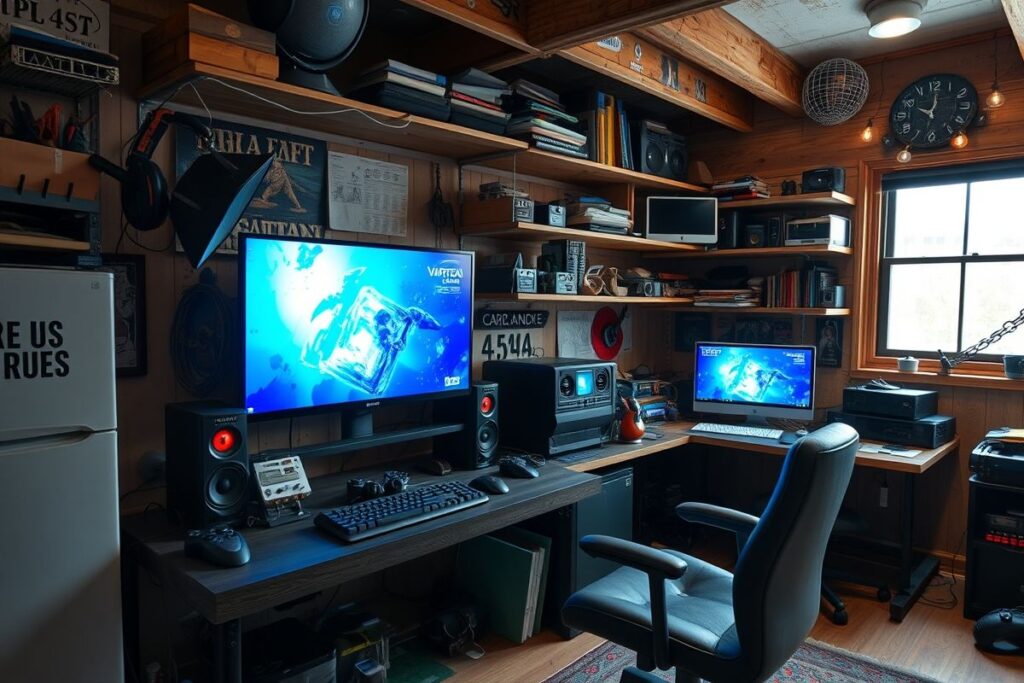From Trash to Treasure: Building a Gaming Station on a Shoestring
Imagine diving into your favorite game, not on a cutting-edge, top-of-the-line rig, but on a system built from repurposed parts and clever budget finds. It might sound like a compromise, but building a gaming station on a shoestring can be incredibly rewarding. Not only is it a wallet-friendly approach, but it’s also a fantastic way to flex your creative muscles and learn about the inner workings of a computer. This guide will walk you through the process of turning discarded tech and budget components into a respectable gaming machine, proving that you don’t need a fortune to enjoy the world of PC gaming.
Scouring for Gold: Finding Your Bargain Components

The Hunt for a Used CPU
The CPU is the brain of your operation, and thankfully, used processors can offer excellent performance at a fraction of the cost of new ones. Check local online marketplaces, community forums, and even computer repair shops for deals on older generation CPUs that still pack a punch.
Consider processors like older Intel Core i5s or AMD Ryzen 5s. These can often be found at significantly reduced prices and provide more than enough power for many modern games. Don’t be afraid to haggle – a little negotiation can go a long way in securing a great deal.
Before purchasing, ensure compatibility with your chosen motherboard. Research the CPU socket type and confirm it aligns with the motherboard you plan to use. This step is crucial to avoid compatibility issues down the line.
Giving a GPU a Second Life
The graphics card is the heart of your gaming experience. While finding a high-end GPU on a tight budget can be challenging, older generation cards can still provide playable frame rates at lower resolutions. Look for used GPUs from reputable sellers and check user reviews for performance benchmarks.
Consider mid-range cards from previous generations, as these often offer a good balance between performance and affordability. Again, research and compare prices to ensure you’re getting the best possible value for your money.
Inspect the card for any physical damage and research its cooling solution. Adequate cooling is essential for maintaining performance and preventing overheating, especially for used cards.
RAM: More is Merrier (and Cheaper Used)
RAM is essential for smooth multitasking and gaming. Fortunately, used RAM is readily available and often inexpensive. Aim for at least 8GB, but 16GB is ideal for modern titles. Ensure the RAM speed and type are compatible with your motherboard.
Check the RAM frequency and timings to ensure they meet your needs. Faster RAM can provide a performance boost, especially in certain games.
Look for deals on RAM kits rather than individual sticks, as this can often save you money. Be sure to test the RAM thoroughly after installation to ensure it’s functioning correctly.
Building Your Budget Battlestation
The Case: Repurposing and Reimagining
You don’t necessarily need a brand-new case. An old PC case, even one with a few cosmetic imperfections, can be repurposed. A fresh coat of paint or some creative modifications can transform a drab chassis into a unique centerpiece for your gaming setup.
Consider using materials like adhesive vinyl or spray paint to personalize your case. You can create custom designs or even replicate the look of more expensive cases with a bit of effort.
Ensure the case has adequate airflow and space for your components. Proper ventilation is crucial for preventing overheating and maintaining system stability.
Power Supply: The Heart of Your System
Don’t skimp on the power supply. A reliable PSU is essential for protecting your components and ensuring stable performance. While a used PSU can be an option, exercise caution and thoroughly research its history and reviews. If in doubt, opt for a new budget-friendly model from a reputable brand.
Calculate the wattage requirements for your system and choose a PSU with sufficient headroom. This will ensure your system has enough power even under heavy load.
Look for PSUs with 80+ certification, which indicates a certain level of efficiency and reliability. This can save you money on electricity bills in the long run.
Storage: HDD vs. SSD on a Budget
While an SSD offers significantly faster loading times, a traditional hard drive (HDD) provides much more storage for your money. Consider using a smaller SSD for your operating system and frequently used games, and a larger HDD for mass storage.
Look for used HDDs with good health ratings and warranties if possible. Back up important data regularly to prevent data loss.
Consider using cloud storage for less frequently accessed files to save space on your local drives.
Optimizing Your Budget Build for Gaming
Software Tweaks and Freebies
Once your system is built, optimize its performance with free software tools. Disable unnecessary startup programs, adjust power settings, and update drivers for optimal gaming performance.
Explore free antivirus and anti-malware solutions to protect your system from threats.
Utilize free game launchers and platforms to access a library of free-to-play titles.
Community Resources and Forums
Tap into the wealth of knowledge available in online gaming communities. Forums and subreddits dedicated to budget PC building are excellent resources for troubleshooting, finding deals, and getting advice from experienced builders.
Don’t hesitate to ask questions and seek help from the community. Many experienced builders are happy to share their expertise and assist newcomers.
Participate in discussions and share your own experiences to contribute to the community.

Leave a Reply